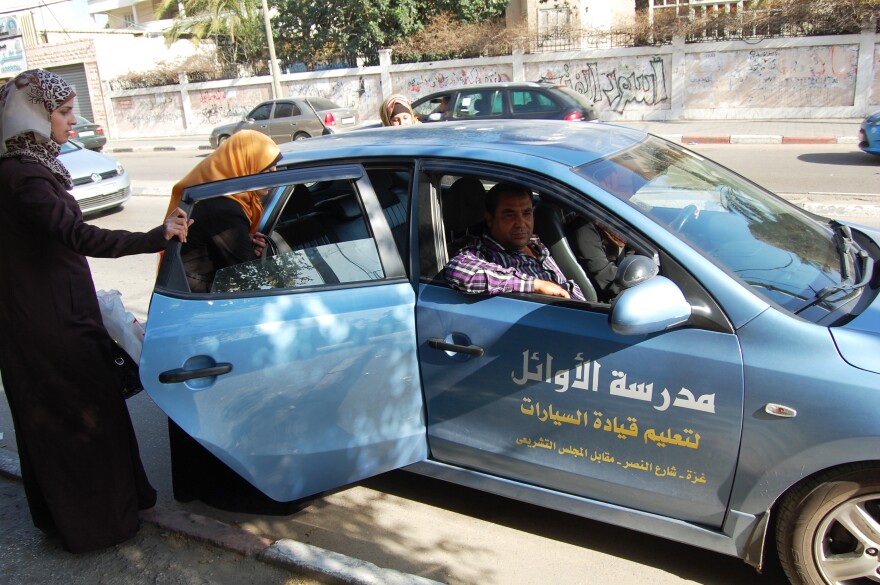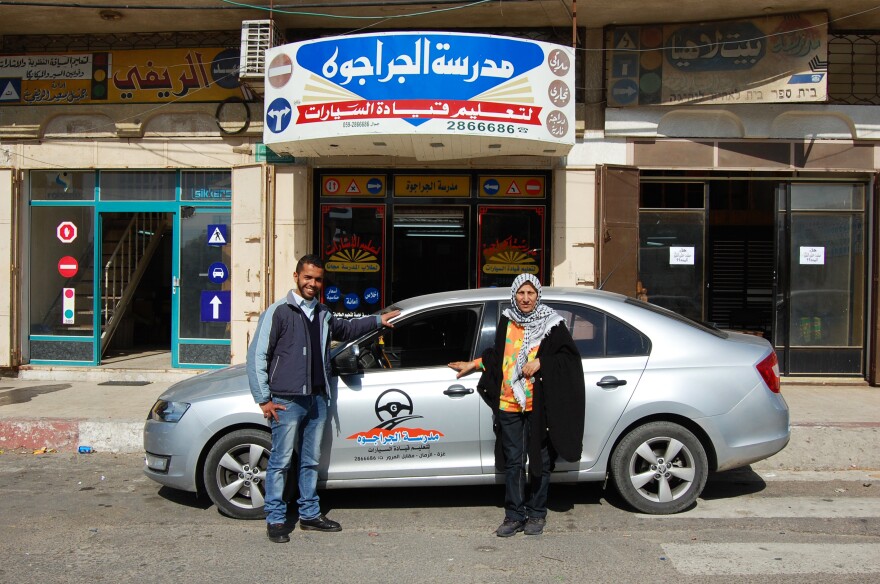Driving instructor Mohammad al-Hattab, 33, remembers very well when police pulled him over last fall.
"It was a Sunday, about 1:30 p.m.," said Hattab in the office of the al-Jarajwa driving school in Gaza City. "I remember two guys on two motorcycles. They were in civilian clothes. One stopped in front of my car. He started shouting, 'Stop, stop, we are police.'"
Hattab had just one student driving with him: a young woman. The cops, from Gaza's internal intelligence, he said, told him the two of them could not be alone in a car. They took his ID, saying he could claim it at the station. Hattab went the next day. But before he could get his documents back, police made him sign a declaration that he'd never again teach a female student alone.
This was the first time in more than a decade as a driving instructor Hattab had heard of such a thing.
"I'm like, 'Why?'" Hattab recalls. "'Have you caught me in some bad situation?' They said, 'We have already arrested a number of instructors with moral failures.' For me, with all due respect, how many, two or three?"
Hattab has heard that a couple of driving instructors were caught fooling around with female friends — not students — in cars belonging to the schools where they work. But punishing him and others, he says, is unfair.
"You can't punish hundreds of instructors for the mistakes of a few," Hattab declares.
It seems Hamas, the militant Islamist group that runs the Gaza Strip, can. Gaza is nowhere near as strict on "morality" laws as Saudi Arabia or Iran. But Hamas police have in the past in for questioning or worse because they sport certain hairstyles or wear low-rider jeans.

Hattab was briefly suspended from instruction, a decision made by the police, not his boss, he says. He complains it's a burden to force female students or the company to make sure a third person can ride along on a lesson.
"It's more complicated," he said.
There are no firm statistics on how many other driving instructors have been stopped or suspended from work. But all of Gaza's driving schools have been aware since last fall of this apparently new government policy.
Abdel Nasser el-Bobbo, 40, an instructor with a different driving school, was also stopped by police. He now schedules multiple students for the same time slot, so they can act as chaperones for each other.
The closest Arabic word for "chaperone" is the very specific "mahram," which means either a woman's husband or a man she cannot marry because they are closely related. According to the head of Gaza's council of religious judges, Hassan al-Juju, a mahram's traditional role is to accompany a woman on the hajj, the Muslim religious pilgrimage to Mecca.
Driving schools in Gaza will settle for any third person as chaperone — a friend, a child, even a boyfriend. Instructors say they don't ask any questions.

But while Hattab sees the enforcement of this morality rule as a burden, Adham Mushtaha, owner of the al-Awael driving school, sees it as an opportunity.
He recently hired a young woman to be always available, should one of his female students not bring her own mahram.
"It's good for business, in a way," Mushtaha said. "If a female student feels more comfortable she might ask for another lesson. That's much better for us. With this I believe a father would encourage a daughter to learn to drive."
His new employee, Rawan al-Nateel, says the job is pretty simple. "I sit," she says. If she's not out on a lesson, she helps around the office, earning about $125 a month at a job she wouldn't have without the mahram rule.
Mushtaha may be on to something. A female customer waiting for her lesson says she likes the requirement.
"It's good to have a third person with you," said Samah Gamal, 30. "It's not that when I don't have a mahram, I don't feel safe. It's for the community. People believe you should not be alone with a man."
Still, the association of driving schools in Gaza has lobbied the government to quit enforcing this policy. The two sides agreed to let religious leaders issue a decree, or fatwa, to resolve their dispute.
Hassan al-Juju, the religious judge, isn't among those who will weigh in. But he doesn't like the rule.
First, he says, it's not necessary.
"I don't think driving schools will put their reputations at risk and hire men who will harass women," he said.
And he really doesn't like the use of the term mahram for "driving school chaperone." He says this obscures the true, religious meaning of a companion for a woman making the hajj.
"We understand as religious people that having the man with the woman is to serve her," he explains, sitting behind a broad desk in his spacious office. "On the hajj, there are millions of people. She might not be able to push them away. He is there to help and serve, not create obstacles."
Copyright 2021 NPR. To see more, visit https://www.npr.org.




